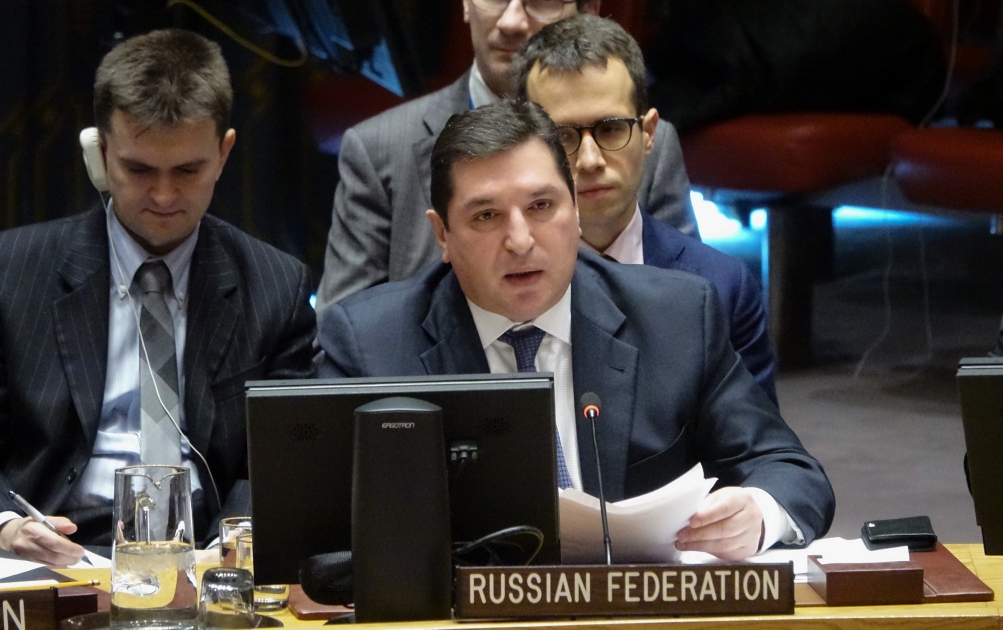Statement by Deputy Permanent Representative of the Russian Federation to the United Nations, Mr. Vladimir Safronkov, at the Secutiry Council meeting on the situation in Afhganistan
We are very grateful to the briefers, Mr. Yamamoto, Special Representative of the Secretary General, Mr. Fedotov, Executive Director of the United Nations Office on Drugs and Crime (UNODC), and Mr. Umarov, Permanent Representative of Kazakhstan, for their thorough analysis of the evolving situation in Afghanistan. Their briefings constitute a good basis for today’s discussion.
We note the selfless work being done by the entire United Nations team in Afghanistan. For our part, we would like to make the following comments. The Government, the armed forces and the people of Afghanistan continue their courageous efforts to overcome the challenges to their security, both old and new.
Having suffered a crushing defeat in the Middle East, the Islamic State in Iraq and the Levant (ISIL) is moving to other regions. The main centre where the terrorists are concentrated is now Afghanistan. There are clear signs that ISIL is putting down roots in the country. A recent result of ISIL’s strengthened presence was the seizure by militants of new areas in the north of the country. Additional ISIL groups are moving into the area. The secret to the jihadists’ successful infiltration is material and military support coming from outside sponsors.
We call on the Afghan authorities and the leaders of foreign presences in the area to take determined steps to rid the country’s northern regions of terrorist elements, which represent a serious threat to the security of our partners the Central Asian States. This cannot be tolerated. It is important that Kazakhstan, as a member of the Security Council, is drawing general attention to the developing situation on the ground. We are also very concerned about the deteriorating drug situation in Afghanistan. As Mr. Fedotov rightly noted, the figures in UNODC’s most recent report are confirm that unfortunate trend.
We are seeing an increase in drug crime and terrorist activities. The situation requires an immediate ramping up of efforts on the part of the international community. We urge everyone to consider the robust efforts of the Collective Security Treaty Organization in that regard. The efforts to counter terrorism in Afghanistan have been going on for 16 years, but the situation remains difficult and military personnel and civilians are still dying. The task of ensuring sustainable development has become harder. The entire system of international efforts there should be rebuilt, based on the principles of cooperation and good-neighbourliness.
Counterterrorism efforts should be supplemented by robust steps aimed at national reconciliation. We wholeheartedly support the view of the Secretary-General that there can be no military solution to the conflict in Afghanistan. The emphasis must be on negotiations to pave the way for rapid national reconciliation. However, that will be possible only through collective, mutually respectful efforts.
There is no place here for competition, hidden agendas or mutual reproaches. We must refrain from unilateral projects, or the situation will deteriorate into a vicious circle. We support the efforts of all initiatives to renew peace negotiations between the Government of Afghanistan and the Taliban leaders and to achieve national reconciliation in the country, led by the Afghans themselves. But the evolution of the political and military situations means that with the surge in terrorist threats emanating from Afghan territory, it will be esesntial to include the country’s neighbours, including the Central Asian States, in the reconciliation mechanisms.
In our view, the Moscow format has in fact achieved that in practice, along with the revived mechanism of the Shanghai Cooperation Organization-Afghanistan Contact Group in its new format. The principle of an honest, equal partnership, based on the efforts of such forums, can help to achieve the desired goals. Afghanistan is at the threshold of a new electoral cycle.
We sincerely hope that the elections will take place in a secure, united atmosphere. Afghan society cannot be allowed to become polarized. The elections should lead to consolidation and enable the country to close this bloody chapter in its history. To sum up, we want to note that Russia and Afghanistan are historically linked through friendship. President Putin has emphasized clearly that the central Government in Kabul needs the support of the international community, and we are ready to provide that support, including by helping to train national personnel in law enforcement and the armed forces and in establishing essential arms and military technical systems.
In that context, we are open to cooperating actively with the United States and other international and regional parties. Russia has contributed significantly to Afghanistan’s development on every front as a major donor and a consistent supporter of the Afghan people’s efforts to find lasting peace. We have a deep-rooted interest in ensuring that Afghanistan becomes a source of stability, prosperity and sustainable development, which accords with our national interests and with regional stability.
